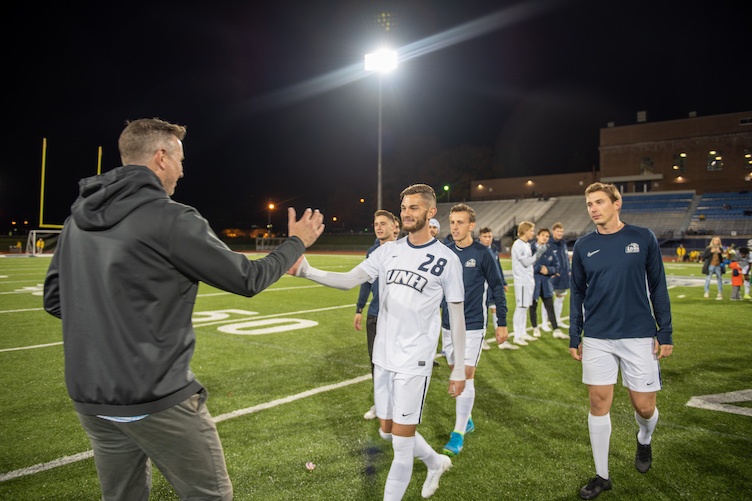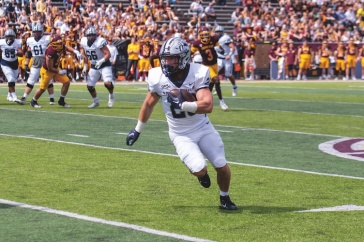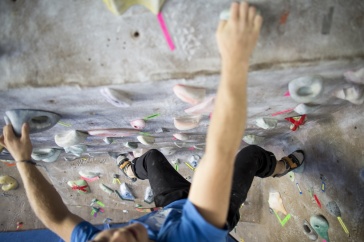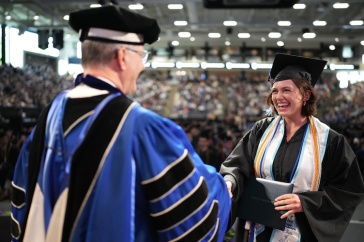
Fabian Lutz ’20G (No. 28, center) had planned to complete a thesis project featuring his UNH soccer teammates as subjects but had to pivot quickly when the COVID-19 pandemic struck.
Given the ultimate outcome, perhaps it was oddly fitting that Fabian Lutz ’20G first received word that his UNH experience was about to look very different when he was already more than a thousand miles away from campus.
Lutz was in Miami for a spring break trip in March of 2020 – about a week before he planned to fully dive into the thesis work for his master’s degree in kinesiology – when the COVID-19 pandemic erupted, prompting the message he received announcing that UNH’s campus would be closed for the remainder of the semester as the university shifted to remote learning.
What followed was a whirlwind journey that saw Lutz fly from Miami to Boston before taking a ride to Durham – where he’d spend all of 12 hours before boarding a flight back to his home country of Germany.
Beyond all the geographic upheaval, Lutz was also left to ponder how he would complete his thesis, which was supposed to be a study of hamstring-to-quadricep (HQ) ratios in soccer players using his UNH teammates as subjects, under the guidance of Summer Cook, associate professor of kinesiology.
“Summer, my mentor, said if you start a project, we will finish it, no matter what. We will find a solution,” Lutz says. “Then it just became, OK, what do we have to do to make that happen?”

men's soccer team.
What they had to do was reimagine the entire project, shifting to a meta-analysis rather than one involving live subjects. Despite the adjustment, the result was not only a completed thesis and master’s degree part for Lutz, but his work was also recently published in the journal Sports Health.
“I was most impressed with Fabian’s flexibility and initiative in pivoting to a meta-analysis so quickly,” Cook says. “He became very proficient in the analysis, and we were able to produce a publishable research study without him physically being at UNH.”
Lutz’s response wasn’t a surprise to Cook, who had already seen first-hand his commitment to earning a degree. Lutz arrived at UNH with athletic scholarship funding for only one year and one summer, meaning he would need to complete what is normally a two-year MS degree in a little over one calendar year.
That opportunity is part of what drew Lutz to UNH in the first place. He said few other schools offered the flexibility to complete the degree work in such a short amount of time, and that coupled with the chance to play soccer made his decision for him.
“The whole package at UNH was pretty much the best I saw,” Lutz says.
After heading back to Germany, Lutz met regularly via Zoom with Cook, several other graduate students and librarian Eugenia Opuda to work through the completion of the reimagined project – meetings that often took place at bizarre hours because syncing schedules proved difficult when separated by several time zones.
Turning the finished product into a piece suitable for publication had its challenges, as well, as Cook noted that the first set of revisions was extensive, and she and Lutz had to put in significant additional time to make the manuscript publishable.
So, just how valuable was Cook’s assistance?
“On a scale of 1-to-10, it was an 11,” Lutz says. “I was unbelievably lucky to have someone help me so much.”
"It's not only about the degree, but it's also about the experience. To me, it was one of the best decisions I ever made. I would do it again if I had to choose."
Cook had similarly positive thoughts on the process. She said she was immediately intrigued by Lutz’s original thesis proposal and enjoyed working in the lab with him prior to the closing of campus, where he taught her about the biomechanics of kicking a soccer ball and limb dominance in soccer players (Cook would still like to complete that study someday if there’s a way to get Lutz back to make it happen). Lutz’s return to Germany and the reconfigured project did little to dampen that enthusiasm.
“I found working with Fabian to be very rewarding,” Cook says. “His work ethic is amazing. In addition to English being his second language, he had to overcome so many more challenges during the pandemic than my other graduate students by being out of the country.”
Lutz had never been to the United States prior to enrolling at UNH, but he credits the entire Wildcat community with easing the transition and creating an atmosphere of home. Even despite the fact that his original project was abruptly turned on its head, he has nothing but positive reflections on his UNH journey.
“It’s not only about the degree, but it’s also about the experience. To me, it was one of the best decisions I could have made,” Lutz says of attending UNH. “I would do it again it I had to choose.”
-
Written By:
Keith Testa | UNH Marketing | keith.testa@unh.edu
















































